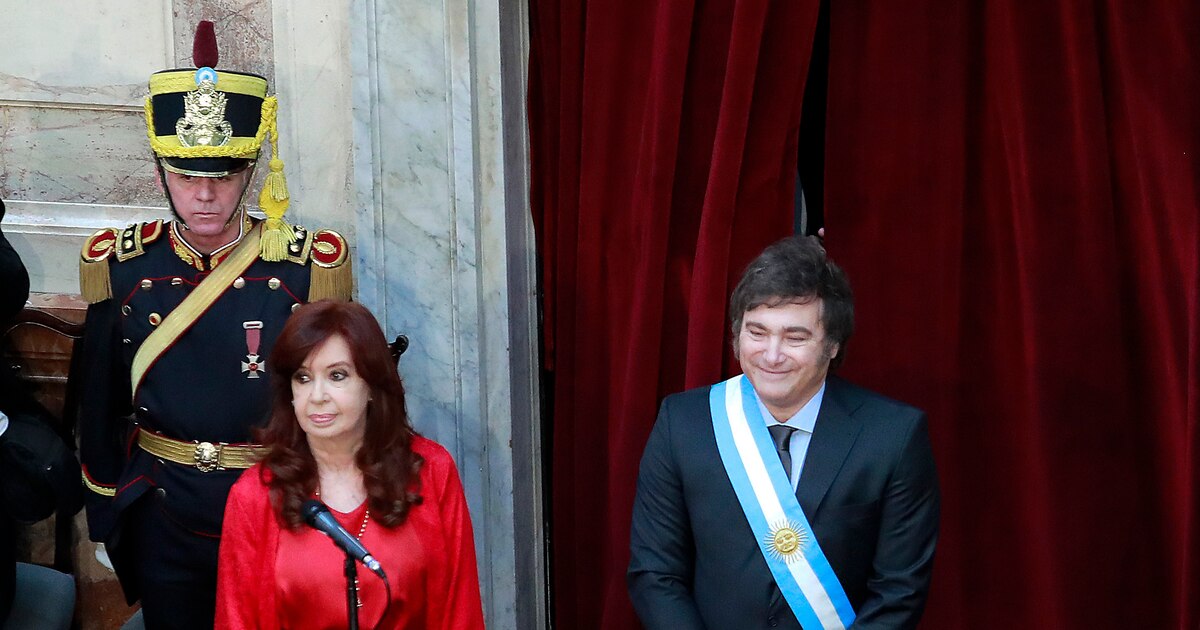All the Answers
Well-known member
“It's the bimonetary economy, stupid”: Cristina Kirchner's letter with a harsh criticism of Javier Milei's government - Infobae

Source:

“Es la economía bimonetaria, estúpido”: la carta de Cristina Kirchner con una durísima crítica al gobierno de Javier Milei
La ex mandataria señaló la problemática por la escasez de dólares, cuestionó los fracasos de las teorías anarcocapitalistas aplicadas en Argentina y las contradicciones del discurso libertario. “La tragedia es inocultable, todo está muy mal”, sentenció. Además realizó fuertes reproches al...
September 06, 2024
The former president pointed out the problem of the shortage of dollars, questioned the failures of the anarcho-capitalist theories applied in Argentina and the contradictions of the libertarian discourse. “The tragedy is undeniable, everything is very bad,” she said. She also made strong reproaches to Peronism, Alberto Fernández and the CGT.

President Javier Milei and former president Cristina Kirchner, together in Congress on the day of the libertarian's inauguration (Photo: EFE/Demian Alday Estevez)
Former President Cristina Kirchner published this morning an 8-page letter, titled “It's the bimonetary economy, stupid” , in which she analyzes the reality of Argentina and strongly questions the policies implemented by the national government headed by Javier Milei .
The text begins with a quote from John Adams , former President of the United States: “ There are two ways to conquer and enslave a nation. One is the sword, the other is debt .” Based on this concept, the former president points out the lack of dollars as the main problem affecting the country’s economy and points out the contradictions between the promises that the current Head of State made during the electoral campaign and the measures that he finally implemented:
“ Once again, as always, reality prevails over extravagant theories, incendiary speeches and marketing phrases .”
“ Milei , the ultra-libertarian who during his campaign promised to eliminate state intervention and control over the lives of Argentines, is now in government, not only intervening and controlling , but also deciding three of the four fundamental prices of the economy:
1) The price of the dollar, through the crawling-peg table of 2% per month
2) The price of money, by setting an ultra-negative reference interest rate
3) The price of work, by setting a ceiling for wage agreements
4) Only the fourth price of the economy has been liberalized, that of goods and services, although with certain limitations: electricity, gas and transportation rates still have meager subsidies in some segments of users, and the State still does not have reliable data on the real costs of these sectors.
"If we add to this way of managing the four prices of the economy Milei's fiscal adjustment - which is inconsistent and unsustainable because it is achieved through non-payment of debts due to the central administration and the withdrawal of the State from the functions essential for the very survival of the country as a Nation - a lethal combination is produced ," says Cristina Kirchner, who speaks of " an undeniable tragedy " in the first part of her analysis.
“In the context of a bi-currency economy like Argentina, it has led to a brutal fall in economic activity and has caused our country to be more expensive in dollars than the developed countries of the world today . This turns the inflation rate of 3% or 4% per month , which Milei and her ineffable Minister of Economy (Luis Caputo) want us to believe is a success, into a true social tragedy as it occurs in the context of a deep economic recession,” diagnoses the former president.
“And as always happens in Argentina, adjustment is followed by beatings . The images of Argentines beaten and gassed - in this case retirees - only confirm the violence engendered by ideologies where citizens are only a variable of adjustment. Everything has become very ugly. Everything is very bad ,” he says in another part of the letter.
In the following lines, Cristina Kirchner points out: “The government has not only practically abandoned the liberal discourse of anti-state interventionism, but has also left aside the monetarist theory that points to monetary emission as the sole and exclusive cause of inflation.”
“On repeated occasions, officials have indicated that they are not going to devalue because inflation is rising : in front of students at the Catholic University of Argentina, “Caputo ruled out a jump in the dollar: 'The only thing you gain by devaluing is that inflation will rise'” ( Infobae . August 21, 2024). In other words: inflation in our country is tied to the movement of the dollar. Welcome to Argentina . These are not the only news from the country where all theories usually die,” he analyzes with a hint of acidity.
“For some time now, foreign rating agencies, agencies linked to finance and even some local economists have begun to publicly express a growing concern about Argentina’s ability to pay its sovereign debt . These are not economic theories or interpretations, but simply adding and subtracting in relation to the curve of foreign currency maturities that our country must face. “ The markets are not concerned about the fiscal front, but about the government’s problems in gathering dollars ,” quotes an article from Infobae from August 25.
“Milei, the former libertarian”
In another part of her writing, the opposition leader again considers that “it is necessary to address the real problem of the Argentine economy from the rigor that concrete experience imposes on any theoretical exercise. Today Argentina does not have the dollars to pay the debt and the markets know it .”“It was this same shortage of dollars that prevented the dollarization that Milei imagined as a stabilization plan to crystallize the formidable transfer of income to the most concentrated sectors of the economy produced after the brutal devaluation and fiscal adjustment. A curious paradox of someone who believes himself to be a beloved and admired leader at a global level, but to whom no one lends a dollar . At this point in the soirée, we almost have to talk about Milei, the ex-libertarian ,” he adds with a strong charge of irony.
The full letter
Es la economiÌa bimonetaria, estuÌpido.pdf
 drive.google.com
drive.google.com
“It’s the bimonetary economy, stupid”
The second part of the text delves into the currency controls, the shortage of dollars and their impact on reality: “It would be convenient that, in terms of economic policy, our economists find a more rigorous definition of the regulation for the acquisition of dollars in the Single and Free Exchange Market (MULC) than that of ' currency controls '.”
“That label - he recalls - was used to stigmatize the measure we had to adopt in 2012, after a strong currency run during 2011 (the presidential election year), which meant the fall of our reserves with the clear intention of causing a devaluation of the exchange rate that, if it had been achieved, would have meant an enormous transfer of income in favor of the sectors that are dollarized. The curious thing about that run driven by the financial sector is that it occurred in the context of an economy that, after the global crisis of Lehman Brothers (2008-2009) was growing steadily and in a scenario of political certainty, translated into the victory in the first round by 55% of the votes. Thus it was revealed that the mainstream discourses about the need for certainty and political and economic stability are just that, discourses .”
He then goes on to review history, recalling that “ since 1972, Argentina is estimated to have experienced 54 currency runs ,” which were recurrent over the last 40 years and “were temporarily interrupted during much of the convertibility period and the presidency of Néstor Kirchner.”
However, he points out that under his administration he suffered the same problems again: " During my two terms I faced currency runs of a persistence similar to that of Alfonsinism, greater than that of Menemism, and only surpassed by that of the Alliance government ."
Mauricio Macri 's administration is also included in the analysis: “ It was 'market-friendly', but it was not spared from currency runs . On the contrary, not only did it experience a strong outflow of capital, but it also had to reinstall the 'cepo' that it had so criticized and that it had lifted in 2016 with great fanfare and thanks to a fierce external debt.”
In the same vein, he highlights that “ said regulation (cepo) could not be eliminated to this day and continues with the cap of 200 dollars. And that was passed by Macristas, Peronists and now even libertarians, all under the strict control of the IMF. This does not mean sanctifying the “cepo”, but understanding from experience and not from theory , the functioning of the economy in Argentina in relation to the dollar issue. It is that, as the title of this chapter says, it is the bimonetary economy, stupid . An economy where the currency that we issue as a State is only used for daily transactions (and not for all of them. E.g.: purchase of real estate). For the other two functions that any currency has, which are those of unit of value and reserve or savings, Argentines use the dollar .”

Mauricio Macri and Cristina Kirchner, face to face in Congress, in the last photo together that reflects the tension that has always marked the bond between the two (Photo: Reuters / Agustin Marcarian)
“ This phenomenon occurs only in Argentina . The use of two currencies, of which the one we do not issue is precisely the most required to hoard legally or illegally, removing it from the economic circuit and forming assets abroad or, to a lesser extent, keeping them “in the mattress”. That same currency is also the only one that can be used to pay for the imports that the country needs to produce, generate wealth and well-paid work. This situation explains the difficulties of the Argentine macroeconomy; even in government administrations that have carried out a substantial reduction of the debt in dollars, as was the case of those developed in the period 2003-2015”, he summarizes in the second part of the writing.
To all this he adds “the geometric debt in dollars produced during the Macri government” that generated “unfulfillable” obligations. In this context, he considers, “there is no need to explain anything else. Although, as we know, Argentina is that strange place where even the obvious must be explained .”
For Cristina Kirchner, the experience of Macri's government with its debt in dollars " is being paid too dearly and its consequences will continue to be suffered for several more generations ."
“Peronism went awry, Peronism went into disarray”
The following chapter puts the spotlight on the PJ and reviews the mistakes it has been making in recent years: “ Peronism went wrong when it forgot that the dead do not pay debts and validated the multimillion-dollar and irregular loan that the IMF, violating its own internal regulations, had granted to Mauricio Macri's government so that he could win the elections. (It went wrong) When for the first time in a Peronist government registered workers did not cover the total basic basket (CBT) . In other words: Peronism with poor registered workers. When it mismanaged the foreign currency obtained from exceptional trade surpluses .”To this critical enumeration he added a very harsh reflection on the administration of Alberto Fernández , although he avoids mentioning his name: “Despite having gone through the pandemic with correct health management that avoided images of a lack of medical care or respirators, cemeteries created for those who died from Covid or, as we saw in New York, refrigerated trucks to transport the corpses; the presidential word was annulled due to the appearance of a photographic document showing the violation of the isolation rules by the person who had signed them .” Of course, the final reference is about the Olivos party .

The images of the remembered "Olive Festival" in full isolation due to Covd-19, which marked a before and after in the management of Alberto Fernández's government
Furthermore, Cristina Kirchner questioned the role of Peronism in other aspects, so some reflections could also be interpreted as self-criticism: “ She did not notice the modification of the labor relations of the economically active population, where workers registered in the private sector are not only a minority, but also, only 40% of them are unionized. The objective consequence is that the union representations characteristic of the 20th century and founding of Peronism, are no longer the majority expression of workers .”
“Peronism became disorganized when it did not advance on the old model of an omnipresent State that led to inefficiency and ineffectiveness (...) which is observed by the rest of society not only with a critical eye due to the lack of results or quality of services in daily life, but because state employment ends up being seen as a privilege compared to the rest and, therefore, an 'unnecessary expense' that must be eliminated.”
The PJ's critical analysis also included that " it did not propose a thorough review and reform of public education; it did not promote the reversal of the fiscal deficit through the reduction of existing tax expenditures through exemptions, exemptions or promotions to concentrated sectors of the economy, nor (activated) a tax reform that would not only simplify tax administration , but would allow for the construction of a more rational and equitable system."
In one of the final paragraphs he regrets that Peronism “ did not know or could not overcome the slogan of social inequality on the one hand and trigger-happy police on the other to address a comprehensive security plan , which also addresses the growing problem of drug trafficking in the poor neighborhoods as a consequence of the withdrawal of the State and the porosity of the security forces.”
Another interesting reflection points to the lack of adaptation to the era of the Internet and social networks: “(Peronism) did not notice the profound changes that have arisen in the field of social communication due to the advance of technology .”
"We must be able to straighten out experiences and organize new demands in order to align thought, word and action : an indispensable trilogy when formulating a proposal and strategy that allows us to organize a political force that once again represents the majority, to go from being the opposition to an alternative government ," the text concludes.

